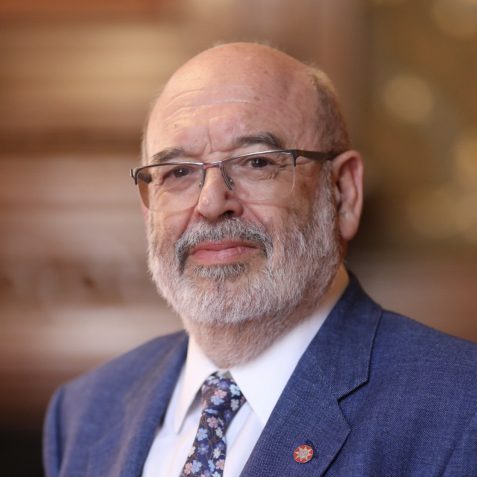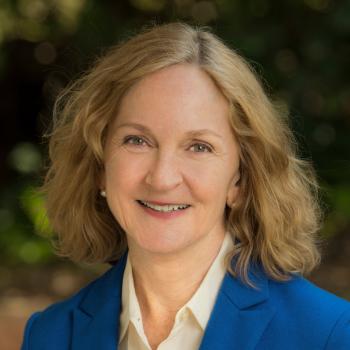
UN Headquarters, New York
Monday 10 July 2023
Moderated by Her Excellency Ms. Mathu Joyini, Co-Chair of the 2023 STI Forum and Ambassador and Permanent Representative of South Africa to the United Nations, this session, held on the first day of the High-Level Political Forum, examined some of the key messages from the 2023 Global Sustainable Development Report and the STI Forum held earlier in the year. The scientific evidence suggests that the SDGs are off track, and still attainable, but only through rapid and drastic action.
Peter Gluckman and Alison Meston, on behalf of ISC Governing Board Member Pamela Matson, spoke at the session.

Peter Gluckman
President, International Science Council
(Written speech may differ from delivered speech)
We say lots of nice things about the role of science and the Sustainable Development Goals, and we try and be positive, but the reality is, if we look at the GSDR report from this year, progress has been absolutely dismal. And we’re hearing the Secretary General talk in terms of rescuing the SDGs – we need now to think about how we resurrect the effort in the in the second half of the SDG window.
I represent the International Science Council, the largest international organization of scientists in the world, including National Academies and scientific disciplines – both the natural and social sciences. And the point that we would like to make is the importance of pluralistic inputs. That means natural scientists and social scientists must both be at the table.
We’ve heard a lot of positive things about the digital transformation today. We haven’t talked about the social costs of the digital transformation. We haven’t talked about the cost to government, to democratization of the digitalization of disinformation, and so forth. We need to be more honest, that with rapid change of a level we’ve never seen before, we need a more integrated approach, where we look at the emergent issues such as the threat to societal organization by the latest generative of AI and what follows and by the rising rates of youth mental health concerns around the world, if we’re going to really make progress.
The key challenge lies in the fact that despite considerable scientific support and claimed alignment with the SDGs, there has been rather little progress. And the reason is a word that applies both to the policy space, and the scientific space. And that word is silos. A lot of work has been siloed, adopting a linear mindset which assumes that science simply generates technology, which in turn provides solutions. This perspective fails to acknowledge the integral role science plays in addressing societal challenges, be it in the fields of natural or social sciences, or in a combination of both.
And science is relatively marginalized within the multilateral system. It’s just part of one of the major groups, it’s not central to the processes, active science is consistently rather sporadically engaged in a scene and a tactical and technical, rather than a strategic goal. We need system thinking we need to use systems thinking and science, which is a science to make progress.
The role of scientists is treated largely no different to any other group, where it’s in fact central to the SDGs and one of the real problems of the SDGs is of course that science was brought to the table well after the SDGs had been designed. Let’s not leave it that way, as we move into the second half of the 2030 Agenda. We need a much more systematic and coordinated approach from the active scientific community.
And I’d like to particularly highlight in this case – President Kőrösi of the 77th UN General Assembly, you’ve done so much to accelerate the introduction of science into the discussions here. And the moderator, Ambassador Mathu Joyini, from South Africa and the representatives of Africa, along with those from Belgium, and India, have been looking at how science can work much better with the Member States through the group of friends, which both UNESCO and ISC will support.
Fundamentally, there’s a large gap between risk assessment and acting on risk. Scientists and technologists are very good at analyzing risks. Climate change, we’ve known since 1985 – the state of the world. COVID, there are lots of warnings that there would be a high viral pandemic well before the pandemic emerged. And yet, there’s a gap. And that gap is a fundamental issue we need to understand – how do we actually communicate better to policy makers and to communities and engage them in understanding that long term thinking starts now, and decisions may now have impacts and multiple generations.
And the issue that the moderator brought to the table now, that of trust in science – it’s not the production of trustworthy science it’s the issue as much as why science is not seen be trustworthy. And that’s got problems within the science community which we’re addressing, and it’s got fundamental problems in the information environment, which we also need to address and we’re working with UN agencies now directly on a joint program to think about how we might address those issues.
But the core issue is science can make a difference if it’s engaged with policymakers. But most member states do not have their own science advisory mechanisms, even though that’s been a recommendation of recurrent STI forums for a number of years. Critically, all Member States, irrespective of their level of development, need their own ecosystem to knowledge generators, scientists, academics, and so forth. We need knowledge synthesizers that can be academies that integrate knowledge together, and brokers, people who can translate between science and the policy community. This is a key issue, which is essential if we’re going to make progress in the next few years.
As I started in my remarks, the SDGs cannot be addressed in 17 silos. It’s quite clear from the last GSDR report and the current GSDR report that the nexus issues are really where the action is – the 17 SDGs don’t align with how government actually operate in practice. And therefore we need to take an effort to think how we move ahead, addressing the issues, the nexus issues, health and well being, climate and energy, and so forth.
And so, Monday next week, next week, the ISC will announce at the High-Level Political Forum a side event, a way to unleash science and that is to produce transdisciplinary research with deeds, new ways of doing research, and so that we can make far more progress on these issues. Thank you.

Goldman Professor of Environmental Studies and Senior Fellow in the Woods Institute for the Environment, Stanford University, United States, and member of the ISC Governing Board
(Alison Meston delivered the speech on behalf of Pamela Matson. Written speech may differ from delivered speech)
Thank you for the opportunity to join this discussion today. I am speaking on behalf of Pamela Matson, an academic researcher in the area of interdisciplinary sustainability science. Dr Matson was not able to join us today due to a cancelled flight. She writes:
In my academic world, many of us carry out use-inspired, fundamental research that we hope will be useful to and usable by the communities who are working toward meeting the SDGs…but sometimes we don’t know what exactly is needed by decision makers, nor how to connect our knowledge with those who can use it. More effectively linking knowledge and action provides a huge opportunity for our progress toward the Agenda 2030 goals.
I’ve had the opportunity to study what works and what doesn’t as we try to link knowledge and action for sustainability…and I’d like to share some those results.
One of the things we’ve learned is that for science to be useful and used, it has to be trusted – it has to be viewed by users as legitimate, credible, salient and relevant to their needs. And we’ve learned that trust comes most easily if research is carried out in collaborative ways with stakeholders and decision makers. The relatively new approach known as ‘transdisciplinary research’ is all about collaboration between research and development teams and stakeholder and decision maker groups, working together to understand problems, design and carry out research, integrate new knowledge with other kinds of knowledge and ways of knowing, (including indigenous and experiential knowledge), and design and implement solutions.
Dr Matson asks – But how do we encourage and facilitate that collaboration? And especially, how do we encourage that collaboration in places around the world which need it most – places that have the least access to science and technology communities? Research has shown that “boundary spanning” organizations and individuals who are trusted by all and who purposefully facilitate that collaboration can be very useful.
We’ve heard about two potential boundary spanning approaches today. Dr. Lopez Portillo talked about the very exciting network of ‘idea banks’ – that both welcome decision makers to pose their challenges in reaching sustainability goals and innovators to help find solutions to them. They basically are proposing a match-maker system to help connect decision maker needs with research and innovation.
Sir Peter mentioned some of the ideas coming out of the International Science Council and its Commission on Science Missions for Sustainability, of which I am a member. The Commission and its technical advisory group propose a different kind of match-making structure – a network of Sustainability Hubs that facilitate engagement, collaboration and co-production among stakeholders and relevant interdisciplinary research communities- addressing complex sustainability challenges in places around the world that need it most.
The International Science Council will release the commission’s report and talk about its implementation next week on July 17 at 8 am in Conference room 11.
Dr Matson continues – I think these “boundary-spanning” approaches are useful – and both have the potential to scale. These will be critical if we want to rapidly increase progress toward the goals.
Another thing we’ve learned is that we need to treat sustainability challenges as systems problems…and there’s evidence to suggest that we haven’t always done that well.
The fact is, we live in a complex world, and interventions that are intended to solve one kind of problem interact with and may have unintended consequences of another. As Sir Peter said, we need to approach our sustainability goals in an integrated way. We need to pay attention to the interactions across the SDGs…and that’s a key characteristics of the Commission’s sustainability hub model.
Finally, we need to realize that to solve complex systems problems, we often need to draw on many different kinds of assets or resources. Yes, technical innovation is necessary, but so is building human capital, good governance systems, smart policies, and trust; so is sustaining natural resources and environment; and creating or using the right kinds of knowledge capital to help with all.
If we think back to the boundary spanning approaches that we talked about earlier, we need to make sure they imbed systems approaches as well. Thank you for your time.

An ISC delegation comprising of Peter Gluckman, President, Salvatore Aricò, CEO, Irina Bokova, Patron and Co-Chair of the Global Commission for Science Missions for Sustainability, Anne-Sophie Stevance, Senior Science Officer and Head of the ISC’s UN Unit, and Bud Rock, Senior Advisor to the ISC met with Antonio Guterres, United Nations Secretary General, on Tuesday 18 July during the High-Level Political Forum.
The delegation discussed the Group of Friends on Science for Action at the UN, the Secretary General’s science advisory mechanism and topics such as the ISC’s response to the COVID pandemic and the need for robust science advisory mechanisms at the Member State level.
Flipping the Science Model: A Roadmap to Science Missions for Sustainability
International Science Council, 2023. Flipping the science model: a roadmap to science missions for sustainability, Paris, France, International Science Council. DOI: 10.24948/2023.08.
Image by the UN Photo Library